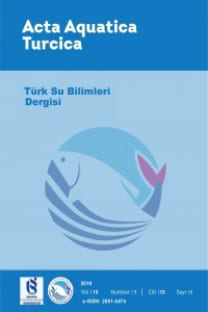Yumuşak Kabuklu Nil Kaplumbağası (Trionyx triunguis): Yuva parametreleri ve yeni bir yuvalama alanı
Trionyx triunguis, yuva parametreleri, sıcaklık, Burnaz Kumsalı, Akdeniz
The Nile Softshell Turtle (Trionyx triunguis): Nest Parameters and A New Nesting Site
Trionyx triunguis, nest parameters, temperature, Burnaz Beach, Mediterranean Sea,
___
- Akçınar, S. C. (2006). Nesting activity of sea turtles in Göksu Delta (Silifke, Mersin, Turkey) 2005. (MSc thesis), Ege University, İzmir, Turkey.
- Akçınar, S. C., & Taşkavak, E. (2017). Population size and structure of the African Softshell Turtle, Trionyx triunguis, in Dalaman, southwestern Turkey. Zoology in the Middle East, 63(3), 202-209.
- Atatür, M. K. (1979). Investigations on the morphology and osteology, biotope and distribution in Anatolia of Trionyx triunguis (Reptilia, Testudines) with some observations on its biology (Vol. 18). İzmir: Ege University Faculty of Science Monographs.
- Baran, İ., Kumlutaş, Y., Kaska, Y., & Türkozan, O. (1994). Research on the Amphibia, Reptilia and Mammalia species of the Köyceğiz – Dalyan Special Protected Area. Turkish Journal of Zoology, 18, 203-219.
- Candan, O. (2018). Impact of nest relocation on the reproductive success of Loggerhead Turtles, Caretta caretta, in the Goksu Delta, Turkey (Reptilia: Cheloniidae). Zoology in the Middle East, 64(1), 38-46. Carr, A., & Hirth, H. (1961). Social Facilitation in Green Turtle Hatchlings. Animal Behaviour, 9(1-2), 68-70.
- Frazer, N. B., & Richardson, J. I. (1985). Annual Variation in Clutch Size and Frequency for Loggerhead Turtles, Caretta-Caretta, Nesting at Little Cumberland Island, Georgia, USA. Herpetologica, 41(3), 246-251.
- Gidis, M., & Kaska, Y. (2004). Population size, reproductive ecology and heavy metal levels in eggshells of the Nile soft-shell turtle (Trionyx triunguis) around thermal Lake Kukurtlu (Sulphurous), Mugla-Turkey. Fresenius Environmental Bulletin, 13(5), 405-412.
- Gramentz, D. (2005). Die Nilweichschildkröte - Trionyx triunguis. Frankfurt am Main: Edition Chimaira.
- Guclu, O., Ulger, C., & Turkozan, O. (2011). Genetic Variation of the Nile Soft-Shelled Turtle (Trionyx triunguis). International Journal of Molecular Sciences, 12(10), 6418-6431.
- Guclu, O., Ulger, C., Turkozan, O., Gemel, R., Reimann, M., Levy, Y., Ergene, S., Ucar, A.H., Aymak, C. (2009). First Assessment of Mitochondrial DNA Diversity in the Endangered Nile Softshell Turtle, Trionyx triunguis, in the Mediterranean. Chelonian Conservation and Biology, 8(2), 222-226.
- Kaska, Y., Sözbilen, D., Başale, E., Katılmış, Y., & Azmaz, M. (2017). Monitoring and Conservation Studies on Nile Soft-Shelled Turtle (Trionyx triunguis) During 2016 Nesting Season on Dalaman and Dalyan Nesting Beaches, Turkey. Paper presented at the 3rd International Symposium on EuroAsian Biodiversity, Minsk, Belarus.
- Kasparek, M. (1994). Die Nil-Weichschildkrote - eine stark bedrohte Reptilienart im Mittelmeergebiet. Herpetofauna, 16(89), 8-13.
- Kasparek, M. (2001). The Nile Soft-Shelled Turtle, Trionyx triunguis, Towards an Action Plan for the Conservation in the Mediterranean (pp. 1-10): MEDASSET.
- Katılmış, Y., & Urhan, R. (2007). Insects and mites infestation on eggs and hatchlings of the Nile Soft-shelled Turtle, Trionyx triunguis, in Kükürtlü Lake (Turkey). Zoology in the Middle East, 40(1), 39-44.
- Kinzelbach, R. (1986). Recent records of the Nile Soft-shelled Turtle, Trionyx triunguis, and of the Euphrates Soft-shelled Turtle, Trionyx euphraticus, in the Middle East. Zoology in the Middle East, 1(1), 83-87.
- Leshem, A., Ar, A., & Ackerman, R. A. (1991). Growth, Water, and Energy-Metabolism of the Soft-Shelled Turtle (Trionyx triunguis) Embryo - Effects of Temperature. Physiological Zoology, 64(2), 568-594.
- Miller, J. D. (1985). Embryology of marine turtles (Vol. 14 Development). New York: John Wiley & Sons.
- Mrosovsky, N., & Yntema, C. L. (1980). Temperature-Dependence of Sexual-Differentiation in Sea Turtles - Implications for Conservation Practices. Biological Conservation, 18(4), 271-280.
- Onder, B. F., & Candan, O. (2016). The feminizing effect of metabolic heating in Green Turtle (Chelonia mydas) clutches in the eastern Mediterranean. Zoology in the Middle East, 62(3), 239-246.
- Ozdemir, A., Turkozan, O., & Guclu, O. (2008). Embryonic mortality in loggerhead turtle (Caretta caretta) nests: a comparative study on Fethiye and Goksu Delta Beaches. Turkish Journal of Zoology, 32(3), 287-292.
- Plummer, M. V. (1977). Reproduction and Growth in the Turtle Trionyx muticus. Copeia, 1977(3), 440-447.
- Rozner, O., & Shaines, U. (2010). Research report on the Nile Soft Shell turtle (Trionyx triunguis) in Nahal Alexander. Israel: Nature Conservation.
- Shanas, U., Gidis, M., Kaska, Y., Kimalov, Y., Rosner, O., & Ben-Shlomo, R. (2012). The Nile Soft-shell Turtle, Trionyx triunguis, of Israel and Turkey: Two genetically indistinguishable populations? (Reptilia: Testudines: Trionychidae). Zoology in the Middle East, 57(1), 61-68.
- Taşkavak, E., & Akçınar, S. C. (2009). Marine records of the Nile soft-shelled turtle, Trionyx triunguis from Turkey. Marine Biodiversity Records, 2, e9.
- Taşkavak, E., Reimann, M. J., & Polder, W. N. (1999). First record of the Nile soft-shelled turtle, Trionyx triunguis, from Kos Island, Greece, with comments on its occurrence in the eastern Mediterranean. Chelonian Conservation and Biology, 3(3), 510-512.
- Türkozan, O., Ilgaz, Ç., & Yılmaz, C. (2006). A Short Report on the Nile Soft-Shell Turtle, Trionyx triunguis (Forsskål 1775), at Dalyan Beach, Turkey. Russian Journal of Herpetology, 13(1), 47-52.
- van Dijk, P. P., Diagne, T., Luiselli, L., Baker, P. J., Türkozan, O., & Taskavak, E. (2017). Trionyx triunguis. The IUCN Red List of Threatened Species 2017.
- Whitmore, C. P., & Dutton, P. H. (1985). Infertility, embryonic mortality and nest-site selection in leatherback and green sea turtles in Suriname. Biological Conservation, 34(3), 251-272.
- Yayın Aralığı: 4
- Başlangıç: 1988
- Yayıncı: Yunus Ömer BOYACI
Su Ürünleri Yetiştiriciliğinde Tıbbi Bitkilerin Anestezik Olarak Kullanımı
Seçil METİN, Öznur DİLER, Hakan DİDİNEN
Laktik Asit Bakterilerinin Balıklarda Büyüme Performansı Üzerindeki Etkileri
Nalan Özgür YİĞİT, Behire Işıl DİDİNEN, Seval BAHADIR KOCA, Tülay DEMİR
Öznur DİLER, Öznur GÖRMEZ, Sedef TERZİOĞLU, Halit BAYRAK
Eğirdir Gölü Su Kalitesinin Trofik Durum İndeksleriyle Belirlenmesi
Türk Mutfağında Su Ürünleri Kültürü ve Önemi
Gülgün F. Ünal ŞENGÖR, Zafer CEYLAN
Ahmet Tahir ERSOY, Seçil METİN, Ertan Emek ONUK
Akdeniz için Kupesin Boops boops (Perciformes: Sparidae) Maksimum Boyu
Tevfik CEYHAN, Okan ERTOSLUK, Okan AKYOL, Aytaç ÖZGÜL
İzmir’in Farklı Bölgelerinde Satışa Sunulan Midye Dolmaların Mikrobiyolojik Kalitesi
Berna KILINÇ, Burcu ŞEN YILMAZ, Buket GÖREN
Yumuşak Kabuklu Nil Kaplumbağası (Trionyx triunguis): Yuva parametreleri ve yeni bir yuvalama alanı
